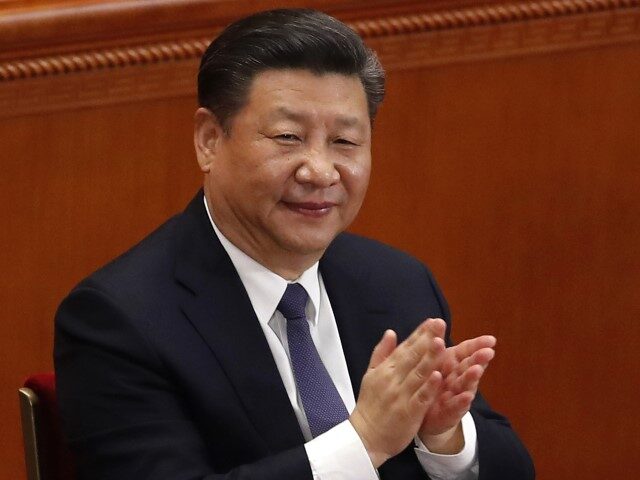Xi Jinping Vows to Improve ‘Communication’ with North Korea as China Loses Influence to Russia
 Andy Wong/AP
Andy Wong/AP
Chinese dictator Xi Jinping sent a message to North Korean counterpart Kim Jong-un on Monday congratulating his country on its anniversary, a note international observers described as relatively cold and a potential sign of discord between the two countries.
China is communist North Korea’s closest ally, but has refrained from major displays of support towards the Kim regime in the past year, particularly after Pyongyang published an excoriating screed against Beijing in May for backing a statement vaguely supporting the denuclearization of the Korean peninsula. North Korean diplomacy has since trended towards Russia, signing a mutual defense treaty with Moscow in July during strongman Vladimir Putin’s first visit to North Korea in decades.
China and North Korea nonetheless rely on each other significantly for ideological and economic support. Xi’s message hoping to “strengthen communication” with Kim arrives as North Korea escalates belligerent behavior against South Korea, flooding the country with a wave of trash-filled balloons over the weekend. China, in turn, faces growing economic challenges and resistance to its geopolitical agenda from the West.
The Korean Central News Agency (KCNA), North Korea’s flagship state propaganda outlet, described Xi’s message as a “heartfelt congratulations” on the anniversary of the founding of communist North Korea.
“I am sure that the Korean people will certainly win a victory, steadily fresh and greater, in the course of promoting the socialist cause of Korean style under the leadership of the WPK headed by you,” Xi reportedly told Kim. WPK is short for the “Workers’ Party of Korea,” the ruling communist party.
Xi promised to “continue to view and deal with the China-DPRK [North Korea] relations at a strategic level and from a long-term angle,” KCNA reported, “and is ready to provide the peoples of the two countries with more welfare and make greater contribution to peace, stability, development and prosperity.”
The Chinese dictator added that Beijing would pursue “developing the traditional China-DPRK friendly and cooperative relations by deepening the strategic communication and boosting coordination.”
The South Korean news agency Yonhap described Beijing and Pyongyang as “relatively estranged” in the context of the founding anniversary message and the upcoming anniversary of diplomatic ties between the two countries. South Korean sources have reportedly not seen any indication that the two countries will plan any “grand celebrations” together to mark the occasion.
Similarly, Radio Free Asia (RFA) observed that Xi’s message “appeared slightly less effusive” than in prior years and was only the second such message to Kim in the past year, the first being a New Year’s greeting.
While still close allies, North Korea and China have kept a diplomatic distance this year compared to those prior, which appeared to expand following China participating in a summit in Seoul alongside the governments of that country and Japan in May. The trilateral summit, the ninth of its kind in modern history, united the conservative governments of South Korean President Yoon Suk-yeol and Japanese Prime Minister Kishida Fumio with the Communist Party and resulted in a joint statement that outraged North Korea.
“We reiterated positions on regional peace and stability, denuclearization of the Korean Peninsula and the abductions issue, respectively,” the three countries said in their statement. “We agree to continue to make positive efforts for the political settlement of the Korean Peninsula issue.”
The North Korean regime described the statement as a “grave political provocation” and a “declaration of war,” notably failing to exclude ally China in its condemnation.
A month later, Vladimir Putin was in Pyongyang for the first time since 2000. Putin spent only two days in North Korea, from June 19 to 20, but used the time for extensive private conversations with Kim and the signing of a mutual defense agreement that restored Moscow-Pyongyang ties to how they were in the Soviet era.
According to Putin, the agreement “provides for mutual assistance in the event of aggression against one of the parties to this treaty,” leading many in the international community to publicly express concern that North Korea would be forced to participate in the ongoing invasion of Ukraine. Both the governments of Ukraine and South Korea have already accused North Korea of aiding the invasion by offering missiles and other weapons.
While Russia and China are allies and have increased their cooperation geopolitically in the past decade, some signs followed Putin’s visit to North Korea that Russia’s inroads there may come at China’s expense. The South China Morning Post noted on Monday, for example, that “two weeks after Putin’ visit, North Korea switched transmission of its state television broadcasts from a Chinese satellite to a Russian one.”
Like Xi, Putin marked the occasion of the founding of communist North Korea with a personal message to Kim, published by KCNA.
“The relations of the two countries based on the excellent tradition of friendship and good neighborliness have reached a high level,” Putin reportedly told Kim, “and it was clearly proved by our constructive talks with full contents held in Pyongyang shortly ago.”
I am sure that the comprehensive strategic partnership between Russia and the DPRK will be strengthened in a planned way thanks to our joint efforts.
Follow Frances Martel on Facebook and Twitter.
Source link

